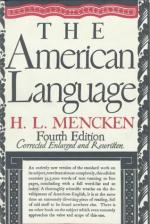|
This section contains 379 words (approx. 1 page at 400 words per page) |

|
Chapter 2.2 Summary
More specific to his previous discussion of differentiation, the author launches into the sources of early, Americanisms. He maintains that the first "genuine" Americanisms were borrowed from "Indian" dialects. He credits scholars such as historian Robert Beverly and others with listing such borrowed words as, for example, skunk, hickory, scuppernong, paw-paw, catalpa, and cougar. These and many other words label items, beings, and places that the new Americans had no experience with prior to immigrating. Therefore American took on already formed terms and labels, says Mencken, explaining that this process involved forthright attempts to adopt new words or alter words to fit their lexicon, offering isquontersquash and squantersquash, and showing how they became squash.
Mencken also describes what he says philologists call the "law of Hobson-Jobson." Besides directly adopting and modifying words to meet linguistic needs, people also use a third procedure. They...
(read more from the Chapter 2.2 Summary)
|
This section contains 379 words (approx. 1 page at 400 words per page) |

|




